Poodle Care
Delving into the wonderful world of Poodle care, this comprehensive guide covers essential topics that every Poodle owner and enthusiast should be aware of. From understanding the origin, history, and purpose of the breed to mastering grooming techniques and nutritional needs, the journey to responsible Poodle ownership begins here. Training, exercise, and health issues will also be addressed. Finally, the guide will discuss selecting the right Poodle, daily care needs, traveling tips, and senior Poodle care, ensuring that you are well-equipped to provide the best possible life for your beloved companion.
Poodle Breed Overview
The Poodle is a well-known and beloved breed that originated in Germany but became popularized in France, where they are known as ‘Caniche’ which means ‘duck dog.’ Historically, Poodles were bred for various purposes, including hunting, water retrieval, and even circus performances. Their keen intelligence and exceptional trainability allowed them to excel in these roles and contributed to their widespread popularity.
Poodles come in three different sizes: Standard, Miniature, and Toy, which gives potential caretakers a range of options to choose from based on their living circumstances, activity levels, and personal preferences.
Standard Poodles are the largest of the breed, with a height of over 15 inches at the withers and weigh between 45 and 70 pounds. They were traditionally bred for water retrieval in hunting scenarios and have since become popular companions and show dogs. Their elegant stance, athletic abilities, and excellent temperament make them well-suited for a variety of competitive dog sports such as obedience, agility, and dock diving.
Miniature Poodles, on the other hand, measure between 10 and 15 inches in height and generally weigh between 15 and 17 pounds. While they were also used for hunting in some cases, they became more associated with companionship as society evolved and their popularity grew. Miniature Poodles are celebrated for their wits, agility, and loyalty making them superb candidates for service, therapy, or emotional support roles.
Toy Poodles, the smallest of the three sizes, stand at 10 inches or less and typically weigh between 5 and 10 pounds. Despite their petite frame, these dogs still possess all the intelligence and trainability of their larger counterparts. Toy Poodles often thrive as companion animals, particularly for those who have limited space or desire a smaller dog. They can still participate in competitive dog sports and fare well in agility and obedience challenges, albeit at a smaller scale.
Regardless of their size, Poodles are known for their hypoallergenic curly coats, exceptional intelligence, and trainability. These traits make them a favored choice for experienced dog owners or individuals who are prepared to invest time and energy into training and socializing their dogs. Socialization is crucial for Poodles, as they can sometimes develop a slightly aloof nature toward strangers. However, with proper care, training, and attention to their physical and emotional needs, a Poodle can make a wonderful addition to any family and prove to be a loyal, loving companion for years to come.

Poodle Grooming
A crucial aspect of caring for your Poodle is maintaining their health and well-being through regular grooming. This includes brushing, bathing, nail trimming, and ear cleaning. Their curly and dense coat requires consistent care to keep it healthy and free of tangles or mats. By giving proper attention to their grooming needs, along with training and socialization, you can ensure that your Poodle remains a happy, healthy, and well-adjusted member of your family.
Brush your poodle’s coat at least once or twice a week to avoid matting and keep their skin and coat in good condition. Always work from the tips of the hair down to the roots to prevent discomfort. Use combs and brushes specifically designed for poodle coats, such as slicker brushes or wide-tooth combs, to make the process easier and more efficient.
Bathe your poodle every three to six weeks or more frequently if they get dirty from outdoor activities. Use a gentle, dog-friendly shampoo to avoid stripping their coat of essential oils. Thoroughly rinse the shampoo from your poodle’s coat to prevent any skin irritation. Regular baths also help remove any loose hair and can minimize matting.
Perform monthly nail trimming for your poodle to avoid discomfort and potential foot issues. Keeping their nails trimmed and smooth will improve their gait and overall physical well-being. Weekly ear cleaning with a gentle, dog-approved cleanser will help keep their ears clean and free of buildup, which can contribute to infections. Ensure their ears are dry after bathing or swimming to avoid creating a moist environment for bacteria to grow.
Professional grooming is essential for poodles, as they require regular haircuts to keep their coat at a manageable length. Depending on their coat type and your preferred hairstyle, you may need to visit a professional groomer every four to eight weeks. Regular visits to the groomer help maintain their appearance and can aid in identifying and addressing any skin or coat issues before they become problematic. In addition to grooming, providing proper nutrition is equally vital for poodles to achieve optimal health and well-being.
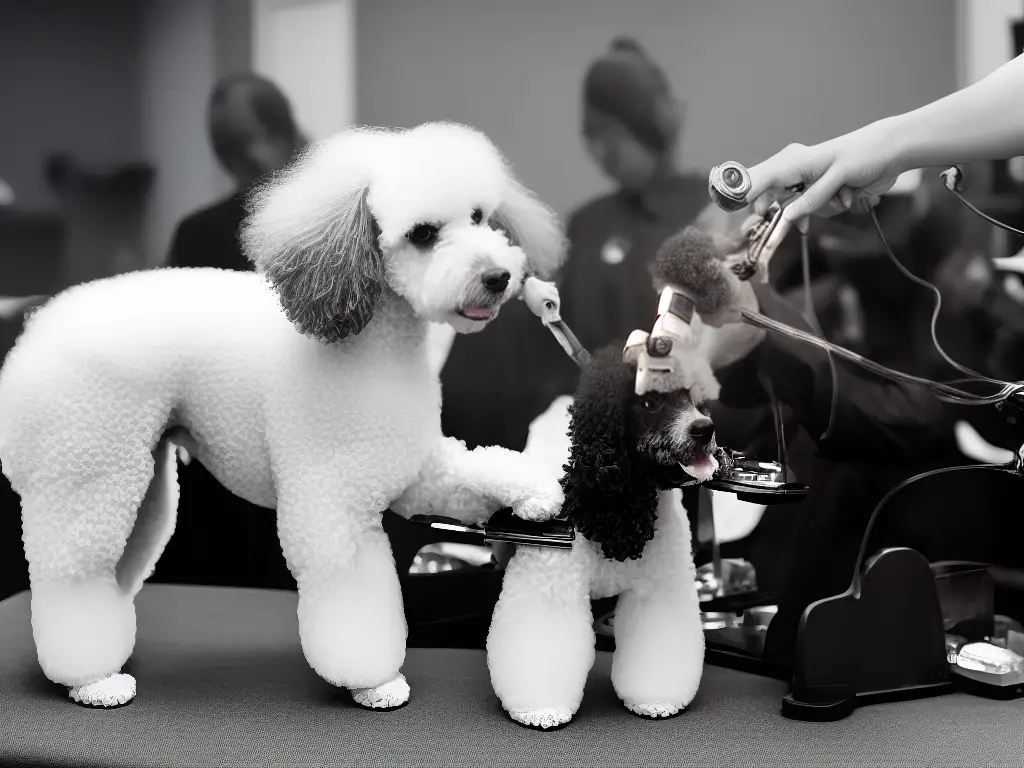
Feeding and Nutrition
Feeding and nutrition play a crucial role in maintaining the overall health of poodles. Like all dogs, poodles require a balanced diet comprising essential nutrients such as proteins, fats, carbohydrates, vitamins, and minerals. High-quality commercial dog foods can fulfill these nutritional requirements for poodles, with ingredients such as lean meats, whole grains, healthy fats, and fruits and vegetables. It’s important to choose dog food that is suitable for your poodle’s age, size, and activity level, as these factors affect their specific nutritional needs. Ensuring your poodle has proper nourishment, combined with regular grooming, will ensure a happier, healthier pet.
Establishing a consistent feeding schedule is important for poodles, as it aids in maintaining their digestion, energy levels, and overall health. Generally, it is recommended to feed adult poodles twice daily, while puppies may need three or four meals per day until they reach six months of age. Be sure to pay attention to the recommended portion sizes for your poodle’s food, as overfeeding can lead to obesity and related health issues. Consult with your veterinarian to determine the appropriate amount of food for your poodle, considering their age, size, weight, and activity level.
Monitoring your poodle’s weight and body condition on a regular basis will enable you to make any necessary adjustments in their feeding and nutrition. A healthy body weight for poodles can vary depending on the size of the dog, with toy and miniature poodles typically weighing between 4 and 15 pounds, and standard poodles weighing between 40 and 70 pounds. To assess your poodle’s body condition, observe their waistline and ribs: a healthy poodle should have a visible waist when viewed from above, and their ribs should be easily felt under a thin layer of fat when lightly touched.
Supplements may be beneficial for poodles, particularly when they have specific nutritional needs or health concerns. For example, glucosamine, chondroitin, and fish oil supplements can be helpful for poodles with joint problems or arthritis, while probiotics can be useful for those experiencing gastrointestinal issues. Additionally, some poodles may require added nutrients due to allergies, skin conditions, or other health issues. Before administering any supplements to your poodle, consult with your veterinarian to assess their specific needs and to determine the appropriate dosage.
It is important to remember that the dietary needs of poodles can change over time, particularly as they age. Senior poodles often require fewer calories due to decreased activity levels, but may need additional nutrients to support their aging bodies and maintain overall health. Be vigilant in observing your poodle’s appetite, energy levels, and body condition, and do not hesitate to consult with your veterinarian if you notice any changes or if you have concerns about your poodle’s feeding and nutrition. Regular check-ups with a veterinarian and ongoing education about poodle care are essential for ensuring that your furry companion is provided with the optimal diet to maintain their health and happiness throughout their lives.
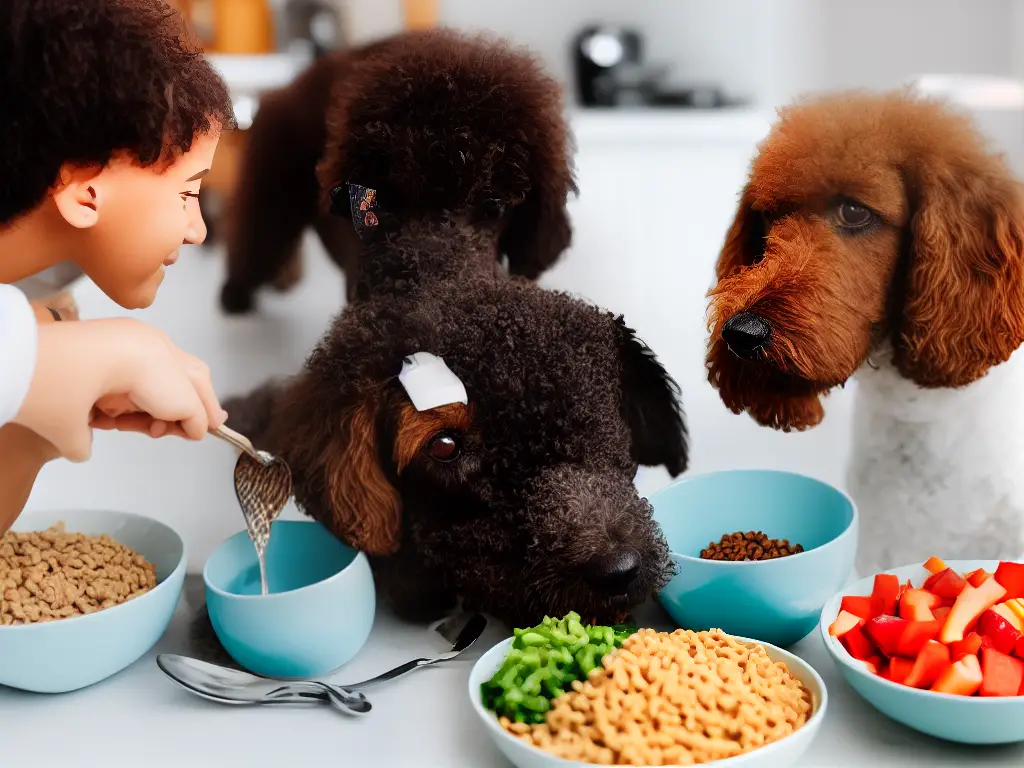
Training and Socialization
Additionally, training and socialization play a crucial role in the development of a well-mannered and well-adjusted poodle. Poodles are highly intelligent and eager to please, making them quick learners when it comes to obedience training. Consistency, patience, and positive reinforcement are key to effectively train your poodle, whether they are a Toy, Miniature, or Standard Poodle. Investing time in training and socialization will not only ensure a well-behaved pet but also contribute to their overall well-being and happiness.
House training is essential for poodles, as it is for any dog breed. Establish set routines for meal times, potty breaks, and nap times, as this helps them understand when they need to go outside. Crate training is often recommended, as dogs instinctually do not want to soil their sleeping area. Remember to praise your poodle every time they successfully eliminate outdoors, as positive reinforcement strengthens the desired behavior. If accidents happen indoors, clean the area thoroughly to remove the scent, which could entice your poodle to eliminate in the same spot again.
Socialization with other dogs and people is vital to a happy and well-rounded poodle. Start socializing your poodle as early as possible, ideally between 3 to 14 weeks of age. Poodles, especially Standard Poodles, may develop fearful or aggressive behaviors if not properly socialized. Introduce your poodle to a variety of people, children, animals, and environments to help build their confidence and adaptability. Puppy kindergarten classes, dog parks, or socialization playdates with other dogs can be fun and engaging ways to expose your poodle to new experiences.
In addition to obedience and house training, mental stimulation is necessary to keep your poodle happy and engaged. Poodles are known for their high intelligence and will quickly become bored if not provided with enough mental and physical activity. Training activities such as agility, nose work, and advanced obedience not only strengthen your bond with your poodle but also channel their energy in a productive manner.
Establishing yourself as the leader in your poodle’s life is essential for a strong, healthy relationship. Dogs are pack animals, and they need to know their place in the hierarchy. This does not mean being harsh or heavy-handed; instead, practice assertive but calm leadership to guide your poodle in the right direction. Providing structure and setting boundaries will help your poodle feel safe, secure, and result in a well-behaved, happy pet.
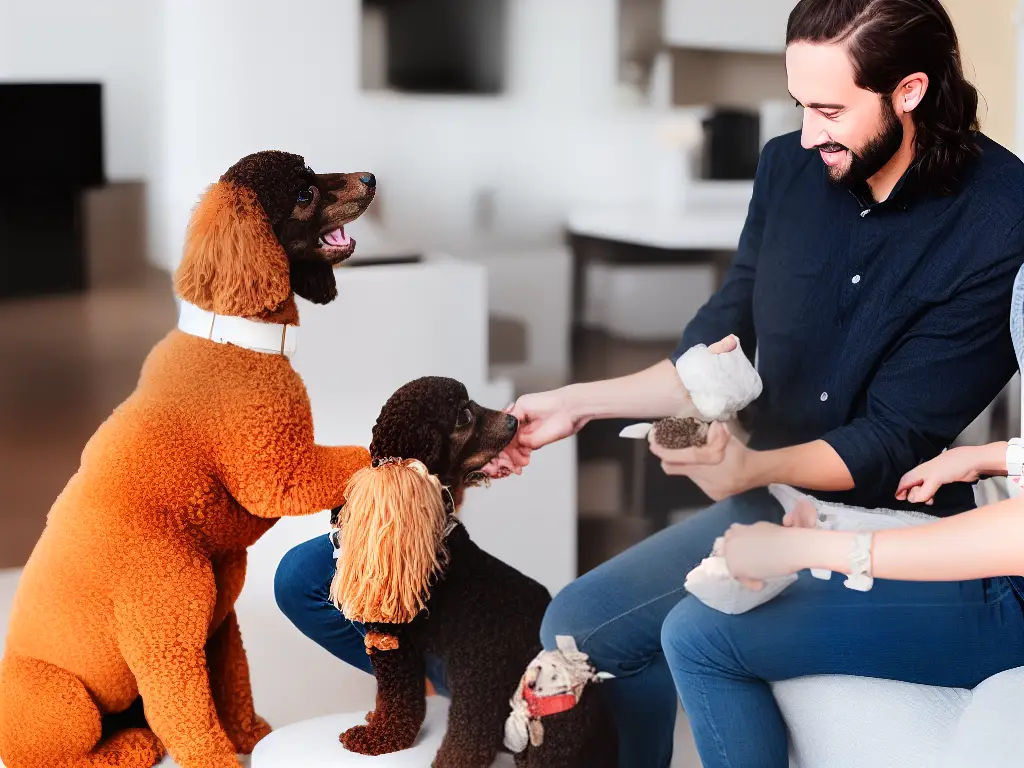
Exercise and Mental Stimulation
Along with providing strong leadership, catering to your poodle’s high energy levels and intelligence is crucial in ensuring their daily care is well-rounded. Regular exercise not only keeps them physically healthy but also helps in managing their energy levels and reducing the chances of developing behavioral issues. Regardless of their size (Standard, Miniature, or Toy), poodles require daily walks, play sessions, and activities that offer both physical and mental stimulation. Ensuring a good mix of activities keeps your poodle satisfied and solidifies the bond between you and your pet.
Incorporating activities such as agility training, fetch, and swimming can provide excellent physical exercise for poodles while also challenging their minds. Agility training, in particular, is a great way to engage your poodle’s brain and body by teaching them to navigate through obstacles under your guidance. Poodles also tend to excel in dog sports such as obedience, rally and flyball due to their intelligence and eagerness to please, which provides additional opportunities for physical and mental engagement.
Mental stimulation is equally important in a poodle’s life, as they are highly intelligent dogs that require challenges to keep their minds sharp. Puzzle toys, scent work, and interactive games are all excellent ways to engage your poodle’s mind throughout the day. When selecting puzzle toys or interactive games, opt for those with varying levels of difficulty to keep your poodle interested and challenged.
One fun and engaging activity for poodles is the hide-and-seek game, where you hide treats or toys around your house or yard and encourage your dog to use their nose and problem-solving skills to find them. This activity not only provides mental stimulation, but also helps to reinforce their natural talents and instincts, such as scent-tracking. Be mindful of providing a safe and supervised environment, and adjust the difficulty of the hiding spots based on your poodle’s skill level.
An important aspect of poodle care is socialization, as it provides mental stimulation. Regular exposure to different environments, people, and other animals helps build your poodle’s confidence and adaptability. Dog parks and group training classes offer excellent opportunities for socialization, while also allowing your poodle to practice their manners and obedience skills. Integrating a variety of exercise and mental stimulation activities into your poodle’s daily routine will contribute to their overall happiness and well-being, ensuring a strong bond between you and your pet.
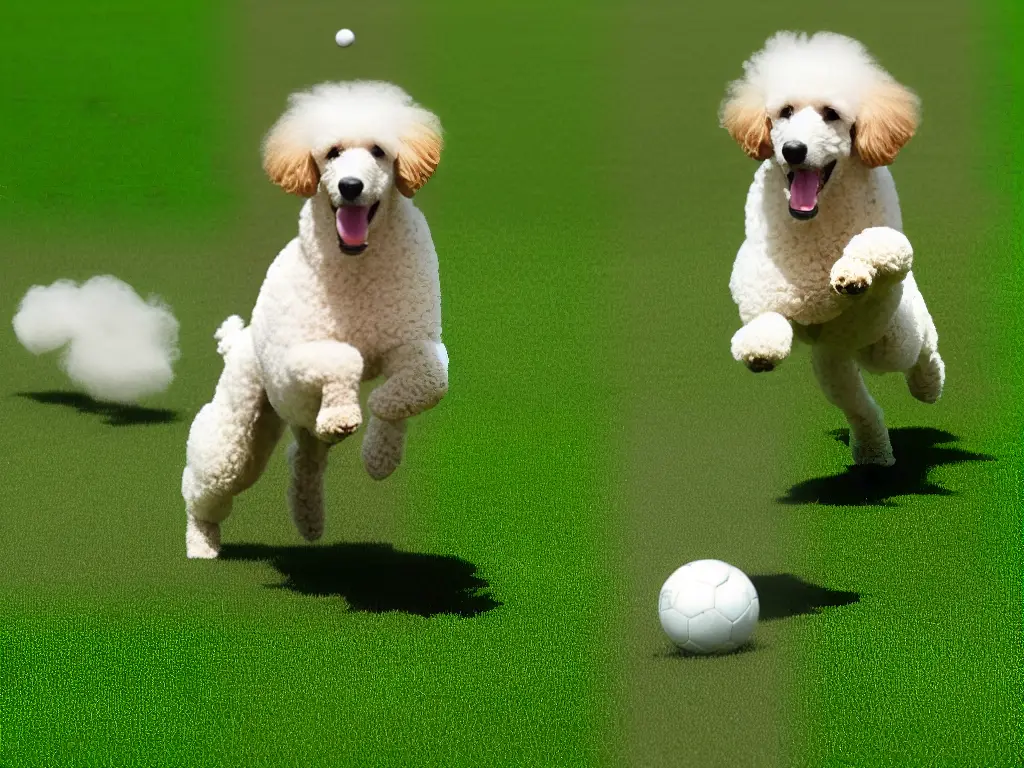
Poodle Health Issues
While poodles are generally healthy and long-lived, they can be predisposed to certain health issues. Being aware of these potential problems and providing proper care can help prevent or manage them effectively, ensuring a healthier, happier life for your poodle companion.
One of the most common health problems in poodles is hip dysplasia, which occurs when the hip joint does not develop properly. This can lead to arthritis, pain, and difficulty walking. Preventative measures for hip dysplasia include providing a balanced diet, regular exercise, and weight control. Owners should also be cautious about over-exercising growing puppies, which can put too much strain on their developing joints. If you notice your poodle favoring one leg, having difficulty with stairs, or showing signs of pain, consult your veterinarian for a proper diagnosis and treatment plan.
Another common health issue in poodles is progressive retinal atrophy (PRA), a genetic eye disease that can cause blindness. PRA affects the retina, which is responsible for processing visual information and sending it to the brain. The condition has no cure, but early diagnosis is vital for slowing the progression of the disease. Poodles affected by PRA may show symptoms such as difficulty seeing in dim light, clumsiness, or increased caution while moving around. If your poodle exhibits any of these signs, consult your veterinarian to discuss ways to manage the condition and provide necessary support.
In addition to hip dysplasia and PRA, poodles may also be susceptible to certain skin conditions such as sebaceous adenitis. This condition affects the sebaceous glands within the skin and can cause hair loss, scaly patches, and itchiness. Prevention methods for sebaceous adenitis include regularly grooming your poodle to remove dirt and dead hair, monitoring any skin changes, and providing a diet rich in essential fatty acids to support healthy skin. If you notice any unusual skin changes, consult your veterinarian for diagnosis and treatment, which may include medicated shampoos or topical medications.
Ear infections are also a fairly common issue for poodles due to their long, hanging ears that can trap moisture and bacteria. Regular ear cleaning and monitoring for signs of an infection can help prevent this issue. Symptoms of an ear infection may include redness, swelling, discharge, or an unpleasant odor coming from the ear. If you suspect your poodle may have an ear infection, consult your veterinarian for appropriate treatment, which may include cleaning the ear and prescribing medication.
Lastly, dental problems are common in poodles, as they may be prone to plaque buildup, tartar, and gingivitis. Regular teeth cleaning, either professionally or at home, can help prevent dental issues and maintain oral health. Providing dental chews, dry kibble, and even raw bones can assist in removing plaque naturally. In addition, owners should monitor for signs of dental issues, such as bad breath, difficulty eating, or loose teeth. If any of these are present, it is crucial to seek veterinary care for treatment and to help prevent further complications.
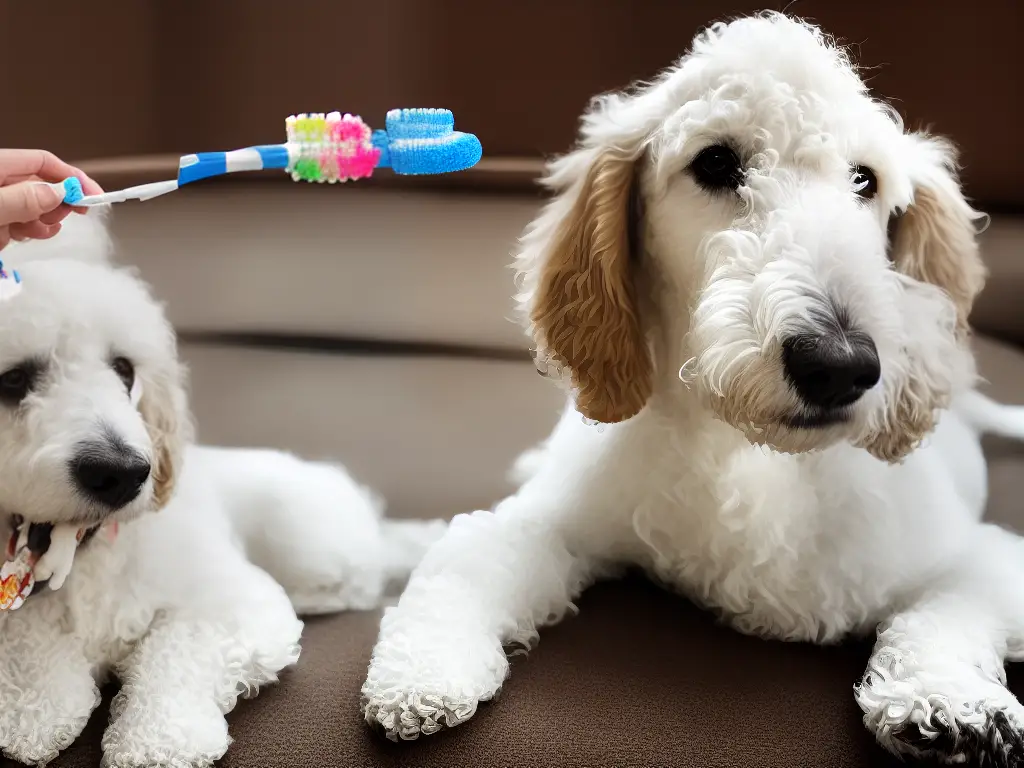
Choosing a Poodle
Moving on to acquiring a poodle, it’s important to research and find reputable breeders or rescue groups to ensure that you are getting a healthy and well-bred dog. Reputable breeders will have extensive knowledge about their dogs and the breed in general. They should be able to provide you with information about health tests and genetic screenings that have been done on their breeding dogs. You can also contact the Poodle Club of America for referrals to breeders in your area. Alternatively, there are numerous rescue organizations dedicated to finding loving homes for poodles in need. A great place to start is by searching websites like PetFinder or contacting local animal shelters to find available poodles looking for a loving home.
Choosing the right poodle for your lifestyle is essential for the overall well-being of both you and your dog. Start by considering the three sizes of poodles: Standard, Miniature, and Toy. Evaluate your living situation and available space when deciding which size will best suit your home. Additionally, consider your lifestyle and how much time you can devote to daily exercise, grooming, and training. Poodles are intelligent and active dogs, requiring regular mental stimulation and physical exercise. They also need regular grooming to maintain their curly coats, no matter the size.
When selecting a poodle, consider the dog’s temperament and personality to ensure that it aligns with your family and lifestyle. Meeting the poodle and observing their behavior and interactions can give you a good sense of their personality. Reputable breeders will often provide information about each dog’s demeanor and assist in determining if it is a good fit for your home. If considering a rescue poodle, the rescue group or shelter can provide valuable insight into the dog’s past experiences and characteristics to help you determine if the dog is a good match for your household.
It’s essential to educate yourself on the potential health issues that poodles may face so that you can keep an eye out for signs and symptoms. Like all breeds, poodles are prone to specific genetic health concerns, such as hip dysplasia, progressive retinal atrophy, and Von Willebrand’s disease, among others. Reputable breeders will be able to provide information regarding their breeding lines and any health concerns that may run in the family. Moreover, regular wellness checks with a trusted veterinarian will be crucial in ensuring your poodle’s overall health and longevity.
Being well-informed about the responsibilities that come with owning a poodle is essential for creating a happy and healthy environment for your furry companion. These dogs require consistent training and socialization to become well-behaved and confident pets. Be prepared to invest time and energy into activities such as obedience classes, agility training, or socialization groups to provide your poodle with the mental stimulation they crave. Building a strong bond with your poodle is key to fostering a lasting and fulfilling relationship.
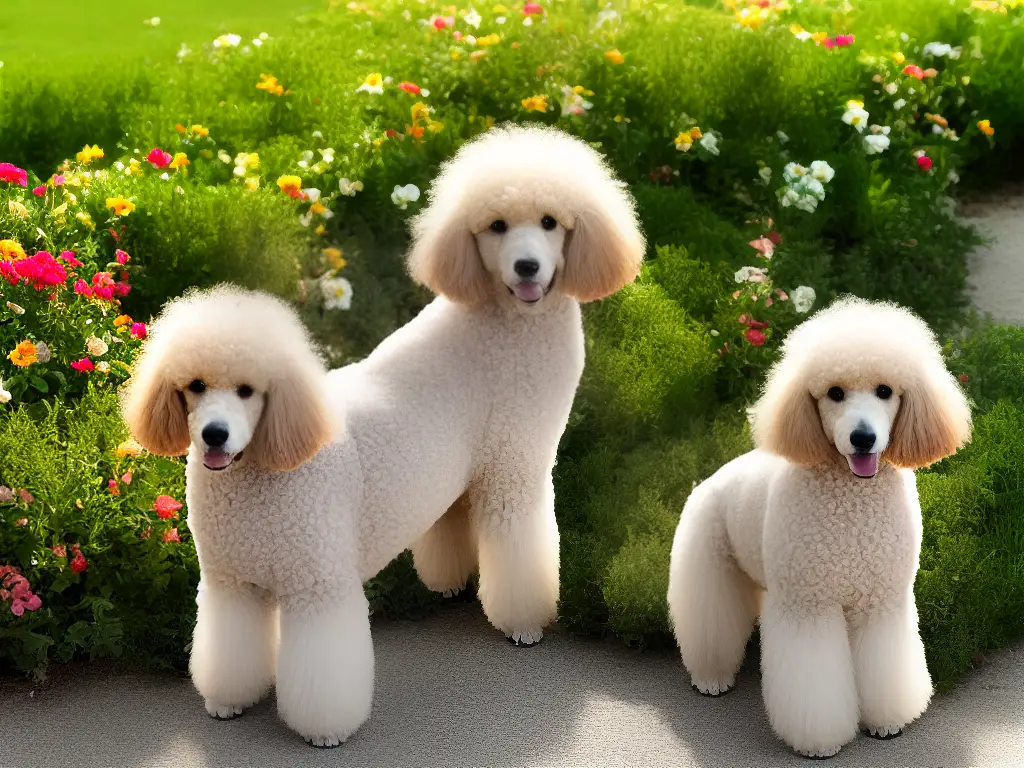
Living with a Poodle
Another important aspect of poodle care is grooming, as this breed is known for its unique curly coat. Regular grooming is essential for keeping their coats clean, tangle-free, and healthy. Depending on the size and coat type of your poodle, grooming needs may vary from a simple brush every few days to more frequent, professional grooming sessions. In addition to grooming, maintaining good hygiene through regular baths, nail trimming, and ear cleaning is crucial for preventing potential health problems. With proper care and attention, a poodle can be a delightful and rewarding addition to your family.
Poodles are highly intelligent and energetic animals that require daily exercise and mental stimulation to maintain their overall well-being. Providing opportunities for play, walks, and other forms of physical exercise will help ensure your poodle has a healthy and active lifestyle. Training and enrichment activities are also important for keeping your poodle mentally engaged and well-behaved. Poodles are quick learners and respond well to positive reinforcement training methods. Engaging in activities such as obedience classes, agility training, and puzzle toys can help strengthen the bond between you and your poodle while keeping their mind sharp.
Creating a comfortable and safe home environment is also crucial for poodle care. This can involve providing a cozy space for your poodle to sleep, such as a soft bed or crate. Ensuring their environment is free from hazards like sharp objects and toxic substances is crucial for their safety. Additionally, poodles are sensitive to extreme temperatures; therefore, it is vital to keep their living space at a comfortable temperature and to protect them from heat and cold during outdoor activities.
Poodles, like all dogs, require a balanced and nutritious diet to support their health. Many high-quality commercial dog foods are available, but it is essential to choose one appropriate for your poodle’s age, size, and activity level. Consulting with your veterinarian can help establish the specific dietary needs of your poodle. Providing fresh water at all times is also a crucial component of poodle care.
Socialization is an essential element of poodle care, as it helps them develop into well-rounded and well-mannered companions. Exposing your poodle to various environments, people, and other animals from an early age can help build their confidence and reduce potential behavioral issues. Regular interaction with your poodle through play, exercise, and training will also contribute to forming a strong bond, ensuring that life with your poodle is a fulfilling and enjoyable experience for both of you.
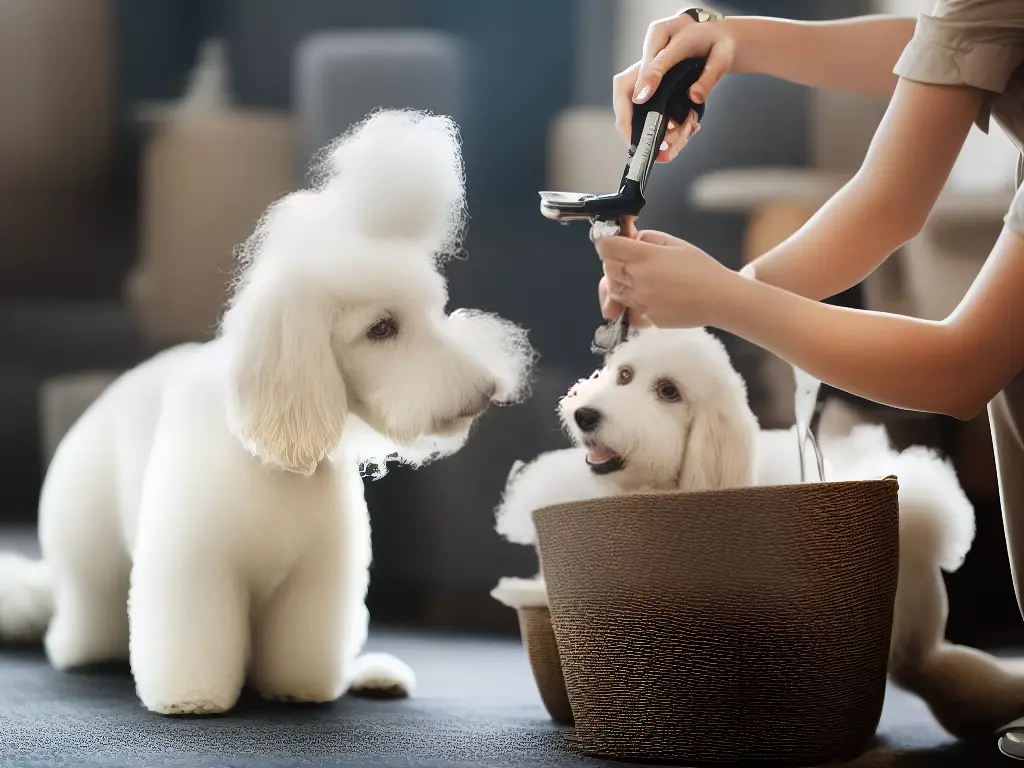
Traveling with a Poodle
Apart from socialization, another aspect of poodle care includes traveling with your pet, which can be a wonderful experience for both the owner and the dog. However, it is essential to be prepared and well-informed to ensure the safety and comfort of your furry companion. One aspect to consider is the mode of transportation you will be using. If you are planning a road trip with your poodle, it is vital to ensure their safety while in the car. Investing in a high-quality, appropriately sized dog crate, carrier, or a dog car harness can keep your poodle secure during the drive. Additionally, remember to make frequent stops to allow your pet to stretch their legs, use the bathroom, and drink some water.
When it comes to airline travel, regulations and policies can vary among airlines. It is crucial to research your chosen airline’s specific pet travel guidelines well in advance. Generally, small poodles may be allowed to travel in the cabin with their owner, provided they are in an approved pet carrier that fits under the seat. Larger poodles, on the other hand, may need to travel in the cargo hold in a sturdy, airline-approved crate. It is also essential to complete any necessary paperwork, such as health certificates and vaccination records, as some airlines and destinations require these documents prior to travel.
Another essential aspect of traveling with a poodle is ensuring their comfort during the journey. Many pets, including poodles, may experience stress or anxiety when faced with new environments and situations. It is essential to bring along familiar items, such as bedding, toys, and even clothing with your scent, to help your poodle feel secure during the trip. Additionally, you should maintain their regular feeding and exercise schedule as much as possible. This consistency can help your poodle feel at ease even if they are experiencing new sights and sounds.
When traveling to new locations, be mindful of the environment and potential hazards for your poodle. Hot climates, for instance, may require you to take extra precautions to keep your poodle cool and hydrated. Similarly, if you are visiting a colder climate, ensure your poodle has proper protection, such as a sweater or a coat, to keep them warm. It is also important to be aware of local dog-friendly areas and accommodations to avoid any conflicts or complications during your trip.
In conclusion, traveling with a poodle can be a rewarding experience with proper planning and preparation. By considering factors such as car safety, airline regulations, your poodle’s comfort, and the destination’s environment, you can ensure a successful and enjoyable trip for you and your poodle companion. Always prioritize the safety and well-being of your pet, and remember that a relaxed and happy poodle will make for a better travel buddy.

Senior Poodle Care
As you continue caring for your poodle, it is important to remember that, just like humans, senior poodles have specific care requirements as they age. Their bodies naturally undergo changes, and as responsible pet owners, it is essential to adapt to these changes and meet their evolving needs. Whether at home or while traveling, attending to the unique needs of your aging poodle will ensure their continued comfort and happiness.
One vital aspect of senior poodle care is paying close attention to their diet. As they age, poodles often become less active, leading to a decrease in metabolic rate. To maintain a healthy weight, adjust their calorie intake accordingly and potentially switch to a diet tailored for senior dogs. This diet should contain essential nutrients that cater to their aging bodies and support joint health, digestion, and cardiovascular function.
Regular exercise remains essential for senior poodles, as it helps maintain muscle tone, joint flexibility, and a healthy weight. The exercise regimen may need to be adjusted to accommodate their changing physical capabilities. Shorter walks or low-impact activities such as swimming can be an excellent alternative for older dogs. In addition, providing mental stimulation through interactive toys and games can help slow down cognitive decline and keep their minds engaged.
Senior poodles will also require more frequent veterinary checkups, preferably every six months. Regular visits help in early detection of age-related issues such as arthritis, dental problems, or diabetes. Preventative measures like vaccinations, flea and tick control, and dental care should not be neglected. Keep an eye out for any changes in your poodle’s behavior, as it may signal potential health issues that need to be addressed promptly.
Caring for a senior poodle also entails ensuring their environment is safe and comfortable. As they age, they may experience reduced vision, lowered mobility, and increased sensitivity to temperature changes. For this reason, it is important to make necessary modifications to their living space. Providing orthopedic or heated dog beds can offer relief to arthritic joints and help maintain body temperature. Non-slip mats and ramps can be beneficial for seniors struggling with mobility. Lastly, be mindful of their accessibility to drinking water, food, and potty areas.
Grooming also plays a vital role in senior poodle care, as it helps keep their skin and coat healthy. Regular grooming sessions allow owners to monitor their poodles for changes in skin conditions, unnoticed injuries, or new lumps and bumps. Be gentle, as their skin may become more sensitive with age. Special attention should be paid to their eyes, ears, and dental hygiene to help prevent infections and other complications. By following these guidelines, owners can ensure their senior poodles are comfortable, happy, and well-cared-for throughout their golden years.
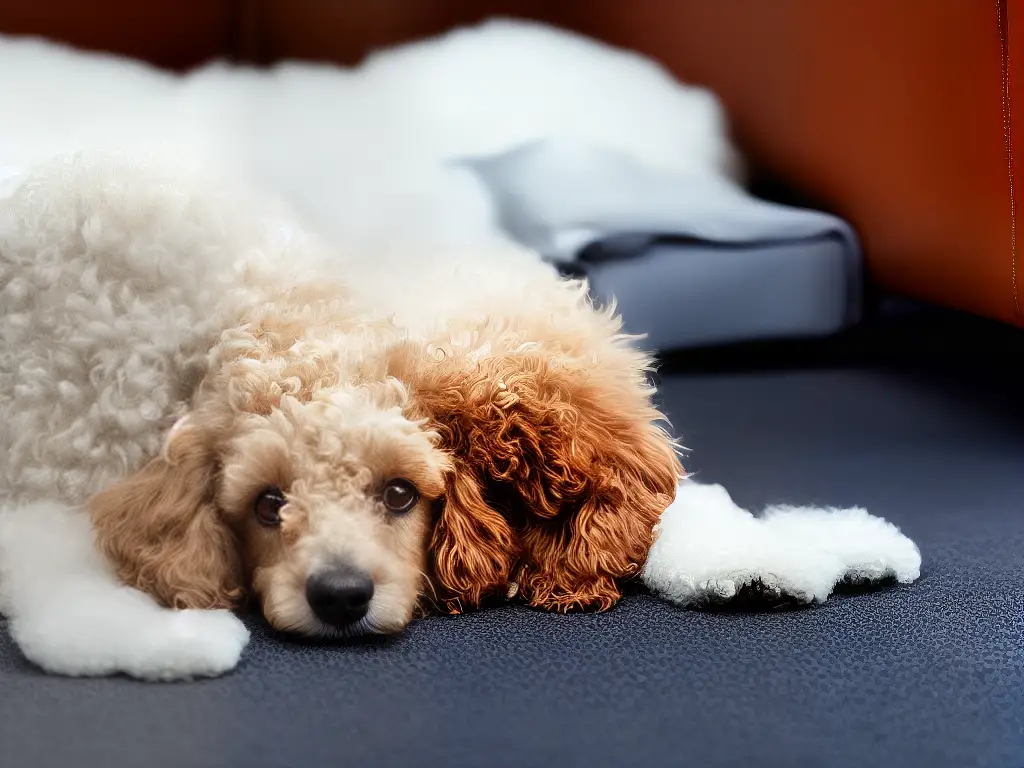
With this range of essential topics covered, readers can now confidently embark on their journey of Poodle care and companionship. Knowledge empowers owners to make well-informed decisions, ensuring a happy, healthy, and fulfilling life for both Poodle and owner. Keep these valuable insights in mind as you navigate through daily caregiving, training, socializing, and even traveling with your Poodle. And as your companion enters their golden years, remember that with proper care and love, you can continue to strengthen the special bond you share, enriching both your lives for years to come.

